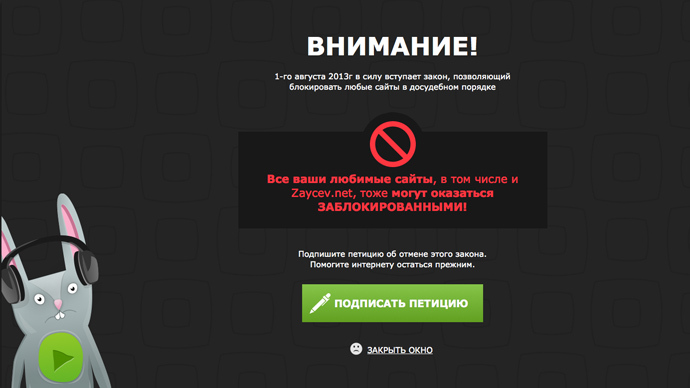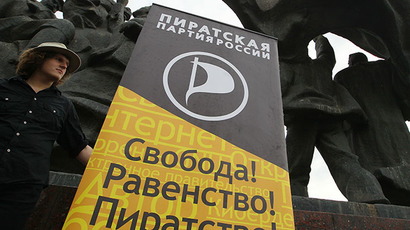1,700 Russian websites on strike against new anti-piracy law

Over 1,700 websites in the Russian internet have joined an online strike against the new anti-piracy legislation, which came into force on Thursday, allowing pre-trial blocking of web-pages.
The content of the websites, taking part in the action, was
unavailable to the users for the day.
Their front pages were blanked, only containing messages
denouncing the law and links to the petition demanding to call
off the legislation.
“All of your favorite websites, including Zaycev.net, may also be
BLOCKED,” the text on the Zaycev.net music website front page
said.
Lurkmore.to, popular online encyclopedia focused on Internet
subcultures, folklore and memes, informed that it’s “closed on
the decision of Roskomnadzor (Federal Supervision Agency for
Information Technologies and Communications).”
"That’s roughly how Roskomnadzor will act after being armed with
the new law. One may try to protest and sign petitions or just
enjoy the ride,” the message explained.
Russia’s biggest e-mail service, Mail.ru, wasn’t closed on the
day, but also spoke out against the law. The website placed a
banner on its main page, leading to a blog post, which described
its views on the issue.
“And now the ‘anti-piracy’ law comes into force. Today, we
live in an online reality where every user became an information
middleman and any page can be shut down for posting a link on the
pirated content,” a statement by Mail.ru said.
Meanwhile, the country’s most visited websites – Yandex and
Rambler search engines, Russian versions of Google, Livejournal
and Wikipedia as well as the largest social networks VKontakte
and Odnoklassniki – ignored the strike, leaving the anti-piracy
law without a comment.
The fresh anti-piracy law faced a lot of criticism when it was
developed and discussed by legislators. The critics noted that it
was strange that it only protected movies and TV series and that
out-of court blocking can be easily used for unfair competition
and even political censorship.
The unregistered Pirate Party of Russia recently held a street
rally against the law and called upon its supporters to reply
with a “Black August” – not go to the movies and not buy
any legal content for a month.
The Roskomsvoboda (Russian Freedom Committee) website has claimed
that it had collected 100,000 signatures in favor of repealing
the law.
This would allow the petition to become a legislative initiative
that should be duly considered by the parliament, but only if the
signatures were collected through a specially designed web-site
Russian Public Initiative (ROI.Ru).
A similar petition posted on the ROI.ru site gathered over 67,000
signatures in less than a month but is still short from the
required 100,000 figure.














